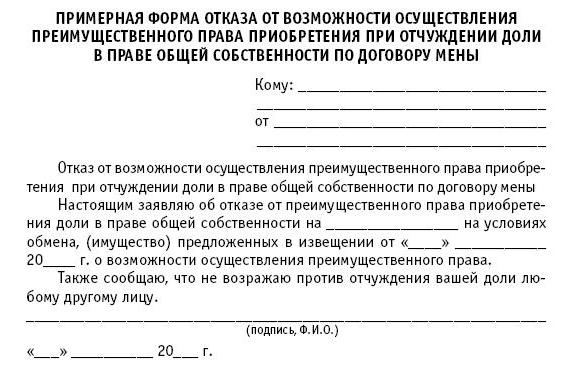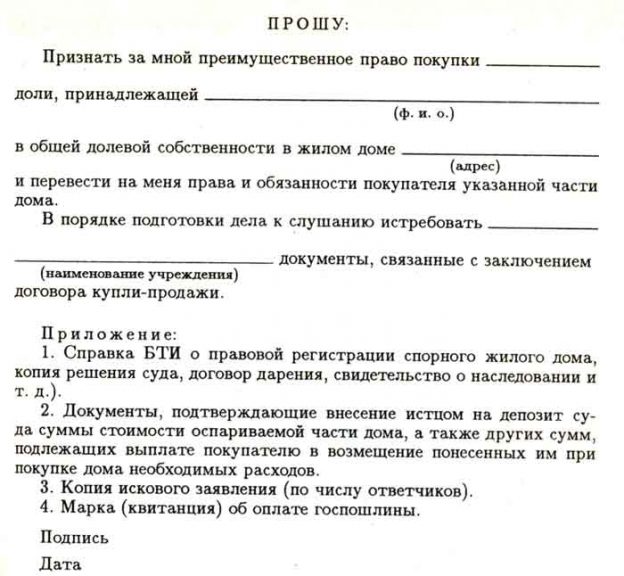Often, one property has several owners. They have some share or a separate room in this object. If one of the owners decides to sell his property, then he must first offer his share to other co-owners. This is due to the fact that they have a preemptive right to purchase. They are offered an object at a certain price, at which in case of refusal it is necessary to offer a room or a share to other buyers. If the price drops, then again you have to contact the co-owners about the offer to buy part of the apartment.
The concept of preemptive law
It is represented by the right of the owner of the room or share in the apartment to acquire another part sold by the co-owner. Only upon formalization of a formal refusal can this property be further offered to unauthorized persons.
The process of using the preemptive right to purchase is regulated by Article 250 of the Civil Code. Therefore, the owner of the object before selling it to others must make sure that all his neighbors in the communal apartment or co-owners of the privatized object are notified of the planned sale, and also do not want to use their legal right. It is advisable to make a refusal in writing. Additionally, the seller must have evidence that he really gave the co-owners notice of the sale of his part.

Emerging issues
People with only a part of one real estate almost always encounter certain difficulties in selling property. This is due to the fact that other co-owners have a preemptive right to purchase a share. The most popular difficulties and problems include:
- Obstacles to the sale of the room are created by other tenants of the property. For example, they directly declare to potential buyers that they will spoil their life, and at the same time they do not want to redeem a share on their own.
- Co-owners refuse to accept a special notice on the sale of property, so you have to send a document by registered letter with a receipt of delivery in order to have evidence of compliance with the requirements of the law.
- Initially, equity holders refuse to redeem a share, but then they go to court to challenge the already concluded transaction with third parties. But if the seller has evidence of the notice of citizens, the court will not satisfy the claims.
- Several shareholders at once may express a desire to purchase part of the apartment, and in such a situation the seller can independently choose with whom the transaction will be concluded.
- You can not notify other co-owners of the sale of the part, if there is an agreement with only one tenant that he will buy the share.
The pre-emptive right to purchase a share in an apartment with a minor implies that it is necessary not only to receive a refusal to redeem a share from its official representatives, but also to obtain permission to sell property from guardianship authorities. At the same time, it is not allowed that the rights of the child are violated in any way through this transaction.
How to prevent risks?
Every person who owns only a certain part of real estate should be well versed in what is the pre-emptive right to purchase a share. In this case, it is possible to avoid the situation when the transaction for the sale of property will be challenged. To prevent various risks, the following points are taken into account:
- other apartment owners are correctly and promptly notified of the planned sale of part of the property;
- if a citizen has good relations with other co-owners, a written refusal is requested;
- if the apartment owners do not want to write a refusal, then a notification will be sent to them by registered letter with a receipt of delivery.
Only if there is evidence that the seller has not violated the rights of other tenants can it be guaranteed that the transaction will not be challenged in court.

Is it possible to circumvent the preemptive right to purchase?
There are certain tricks that make it possible not to receive refusal from other citizens and not to send them a notice on the sale of a part of the property. The main such methods include:
- Making a gift agreement, not a sale on the basis of a contract of sale. The pre-emptive right to purchase is valid only for the sale of a share, not a gift. Each person has the right to freely dispose of his property, so he can donate a share to any person without difficulties and the possibility of contesting. But if the co-owners have evidence that the reimbursable transaction is being hid, then it is recognized in the court as feigned on the basis of Art. 170 GK.
- The increase in the value of part of the property. The sales contract may indicate a high price, but in fact the object is transferred at a different cost. Such transactions are fraudulent, so if their nuances are made public, they are recognized as null and void.
- Making a deal with a pledge. For example, the seller of the room draws up a loan from the buyer, for which an official document is drawn up. Under this agreement, part of the property is provided as collateral. Further, the compensation is written, as a result of which the creditor refuses the money, and the seller transfers his property to him for this. But when using such a scheme, you will have to register officially both the pledge agreement and the compensation contract.
Such tricks are usually used if there is really a bad relationship between the residents of the same property, so citizens try to use their preemptive right to annoy the co-owner of the property.

Rules for Notifying Citizens
If the owner of a share in one object decides to sell his property, then he performs the following actions:
- on the basis of Article 250 of the Civil Code of the Russian Federation, all other co-owners have a preemptive right to purchase, therefore, initially they are offered a share at a certain cost;
- Further, a written notification is compiled containing information on the planned sale of property;
- the document indicates the price at which the transaction is planned;
- installment plans or other options may be offered under this document, allowing other apartment owners to redeem a share;
- Based on this notice, the remaining owners of the property make a refusal or enter into a transaction.
If citizens simply refuse to accept the notification, it is sent to them by mail, and in addition they will have to pay a delivery notification so that the seller has evidence of compliance with the requirements of the law. Under such conditions, the notification is legally binding even if the addressee refuses to receive the letter.
30 days after sending notifications, you can start selling the stake to unauthorized persons if the co-owners have not expressed a desire to purchase it on their own.

Ways to send notifications
It is advisable to give the document personally for signature. But in practice, there are often situations when there is too much disagreement between the owners of the same property. But even under such conditions, it is not allowed to ignore the preemptive right to purchase a share in an apartment. A notification can be sent in various ways:
- telegram sending;
- sending a document using a notary public;
- Sending a valuable letter yourself.
In any case, you will have to pay for the notification of delivery of the document. Be sure to save payment documents confirming the sending of the document. These documents are the evidence during the trial.
What information is contained in the notification?
Advance notification of the transaction guarantees compliance with legal requirements with respect to the preemptive right to purchase a share in an apartment. A sample of such a notice can be found below.
Be sure to include the following data in this document:
- apartment address;
- information on the size of the existing share;
- the value at which the property is being sold;
- direct offer to use your right and redeem part of the object;
- it is indicated that if this proposal is not accepted, the share will be sold to third parties;
- a request is written below to draw up a refusal or consent in writing;
- the date of the notification and the signature of the applicant are set.
The main condition is the need to sell the property exclusively at the price indicated in the notice. If all co-owners refuse to buy, then you can continue to sell at this price. If the seller cannot find buyers, then he cannot simply lower the price. To do this, they again draw up notifications, which indicate a lower cost. If one of the co-owners agrees to redeem the share, an agreement is drawn up with him. The preemptive right to purchase an apartment allows you to increase the share of existing property owners.

Responsibility for violation of rights
Often, citizens who own a share in real estate simply ignore the pre-emptive right to purchase a room in an apartment that other co-owners have. This leads to a violation of the rights of citizens.
The main negative consequence of such a violation is the ability to challenge the transaction. Since the seller will not have evidence of the timely provision of a notification by another co-owner, the transaction is disputed. The citizen will have to return the amount of funds received from the buyer, and then perform the procedure on the basis of legal requirements.
Is it mandatory to demand a refusal?
If there is a good relationship between the co-owners, then it is advisable to ask to write a refusal, if citizens do not want to redeem part of the property.
A refusal is not required if a notification is sent by mail, since anyway the sender has evidence of compliance with the requirements of the law. It is necessary to wait for an answer within 30 days. If it is absent, then you can still deal with the sale of shares to third parties.

Other nuances
The pre-emptive right to purchase a room in a communal apartment or privatized property is most often used, but it exists in other areas. These include:
- When renting. If any object is leased, then the people living in this apartment, after the auction is put up for auction, have priority as buyers. This is due to the fact that the living quarters are already inhabited by these citizens.
- For a municipal facility. If the municipality puts up for sale the building in which citizens live on the basis of a social loan agreement, then people are given the same housing on the same grounds or the preemptive right to buy the property. Therefore, tenants have the right to participate in the auction with other persons, and can also take advantage of other participants. Therefore, if they agree to a buyback, then the auction is simply not held, since a deal is directly concluded with them.
- For seized property. If any object is seized and confiscated for debts, then it is sold at auction. A debtor may participate in the auction, who additionally has the right to redeem it directly without bidding.
The main purpose of this right is the opportunity for people who already use the property to become its full owners.

Conclusion
Different citizens have pre-emptive rights in various fields in relation to all kinds of property. It is implemented in various ways, and its main purpose is the opportunity for citizens to buy out housing that they actually use.
If these rights are violated, the transaction is easily contested in court.
